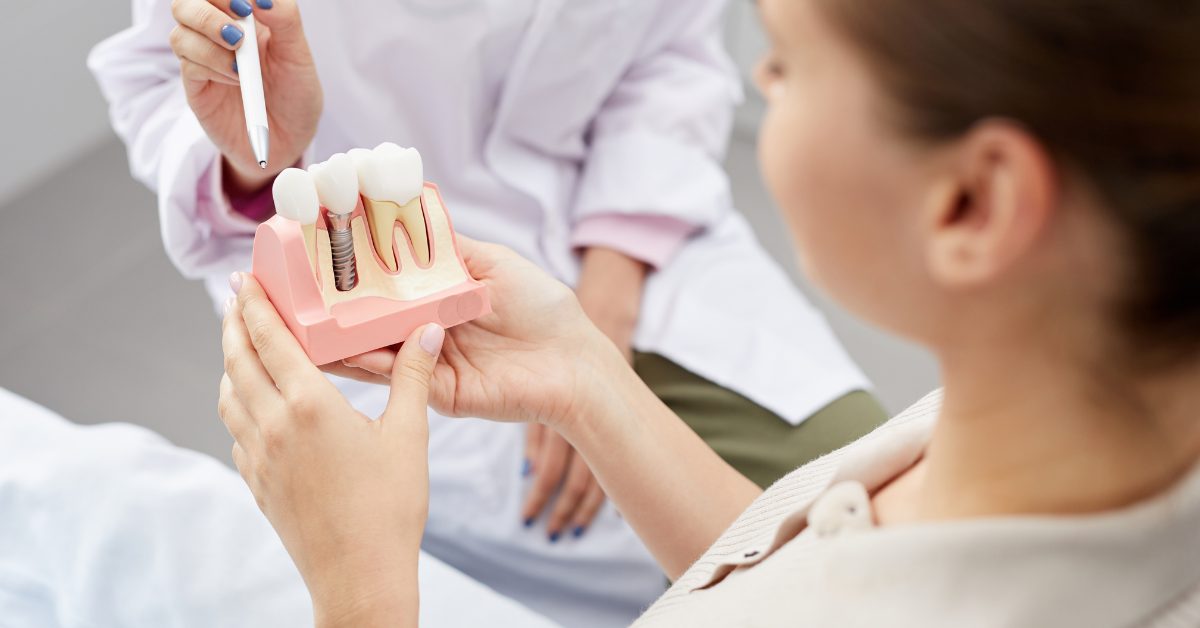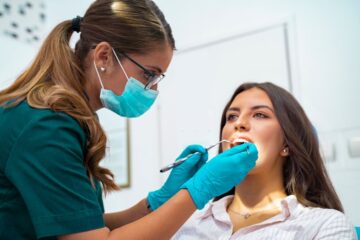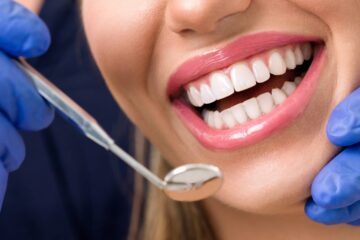Navigating the journey to a perfect smile after dental implants can be tricky. You’re in the right place to learn how to speed up your recovery.
This guide will walk you through everything you need to know – from maintaining proper oral hygiene to making lifestyle changes.
So, let’s dive in and get you back to that contagious, confident smile quickly!
Key Takeaways
– Proper oral hygiene practices, such as regular brushing and flossing, are essential for a speedy recovery after dental implants.
– Following a balanced diet with the right nutrients, including protein, vitamins A, C, and E, zinc, and iron, can promote rapid healing.
– Regular follow-up appointments with the dentist are crucial to detect and address any potential complications early on.
– Making lifestyle changes such as incorporating light exercises, getting adequate sleep, and staying hydrated can aid in the healing process after dental implant surgery.
Understanding Dental Implant Recovery
After getting your dental implants, it’s crucial to understand the recovery process to speed up your healing time. Remember, implant durability largely depends on your aftercare. The better you follow the post-procedure instructions, the more you enhance the longevity of your implants.
During recovery, you could experience some complications. It’s normal to go through minor discomfort, swelling, or bleeding. However, persistent pain, inflammation, or infection could indicate a problem. Don’t ignore these signs; immediately consult with your dentist to prevent further complications.
You might be tempted to return to your regular activities right after the procedure. Resist that urge. Your body needs time to heal. Ensure you take enough rest, eat a balanced diet, and maintain oral hygiene. Avoid hard, hot, or spicy foods that could irritate the surgical site. Stay away from strenuous physical activities that could lead to unnecessary pressure or injury.
Nutrition for Rapid Healing
To help your body heal quickly, it’s essential you pay special attention to your nutrition during the recovery period. Balanced Diet Benefits are significant, as they provide the necessary nutrients that improve wound healing and immune function. Consuming a diet rich in protein, vitamins A, C, and E, as well as minerals like zinc and iron, can speed up your recovery process post dental implants.
Certain foods like lean meats, dairy, fruits, and vegetables are excellent sources of these nutrients. However, given that your ability to chew might be compromised, try incorporating these nutrients into smoothies or soups.
Additionally, hydration is crucial for healing. Water aids in nutrient absorption and distribution throughout your body, thus promoting faster recovery. Avoid alcohol and caffeine, as they can dehydrate you and slow down the healing process.
Supplement Recommendations can also aid your healing journey. Vitamin C, for example, promotes collagen production which is essential for gum healing. Zinc supplements can enhance immune function and wound healing. However, it’s best to consult with your healthcare provider before starting any new supplements to ensure they’re appropriate for your specific needs.
Your nutrition significantly impacts your healing process after dental implants. By paying attention to it, you’re putting yourself on the path to a speedy recovery.
Proper Oral Hygiene Practices
During your healing process, it’s vital that you maintain excellent oral hygiene to prevent infection and promote faster healing. This involves not only regular brushing but also proper brushing techniques. Using a soft-bristle toothbrush, clean your teeth at a 45-degree angle to the gums, moving the brush in short strokes. This method is effective in removing plaque without aggravating your implants.
Flossing effectively is another crucial part of your oral hygiene routine. Gently slide the floss between your teeth, curving it against one tooth as you slide it back and forth. This action dislodges food particles and plaque that your toothbrush can’t reach, offering further protection against infection.
Rinsing with an antimicrobial mouthwash can also help. This type of rinse can kill bacteria that might cause infection and delay your healing process.
Moreover, remember to schedule regular dental check-ups for professional cleaning and monitoring of your dental implants.
Importance of Regular Follow-ups
Your dentist’s role in monitoring the progress of your implants is crucial, so don’t underestimate the importance of regular follow-up appointments. These visits allow the dentist to detect any post-implant complications early, making it easier to manage and treat them. Potential issues, like infection, implant movement, or gum inflammation, can be addressed promptly, reducing the risk of further complications.
Appointment adherence is an essential part of this process. Missed appointments can result in unnoticed problems, prolonging your healing time and potentially leading to more serious complications. Remember, dental implants are a significant investment in your health and appearance. Protect that investment by sticking to the recommended follow-up schedule.
Each visit provides an opportunity for your dentist to assess the integration of the implant with your jawbone, ensuring it’s stable and functioning correctly. They’ll also check your overall oral health, as conditions like gum disease can impact the success of your implants.
Lifestyle Changes for Speedy Recovery
Adopting certain lifestyle changes can significantly speed up your recovery after getting dental implants. By adjusting your habits, you can enhance your body’s healing process and reduce the discomfort associated with dental implant surgery.
Here, we’ll discuss four key areas where changes can lead to a speedier recovery.
– Exercise: Regular physical activity can stimulate blood flow and promote faster healing. However, don’t overdo it. Stick to light exercises, such as walking or yoga, to avoid strain. Remember, the exercise benefits you’re seeking are focused on recovery, not fitness.
– Sleep Patterns: Ensuring adequate, quality sleep is vital for your body to heal. Aim for 7-9 hours each night, maintaining consistent sleep patterns to allow your body’s natural healing processes to work optimally.
– Nutrition: Opt for a diet rich in vitamins, minerals, and protein. These nutrients are essential for tissue repair and can boost your overall recovery.
– Hydration: Drinking plenty of water can aid in flushing out toxins and keeping your mouth clean, reducing the risk of infection.
Frequently Asked Questions
What Are the Alternatives to Dental Implants, Should the Recovery Process Deter Me From Getting Them?
If implant costs or recovery time concerns you, consider alternatives like bridges or dentures. They’re typically cheaper and require less healing time. However, implants offer durability that other options can’t match.
Are There Any Exercises or Physical Activities That Can Enhance the Recovery Process After Dental Implant Surgery?
You’re curious about exercises to speed up recovery after dental implant surgery. Maintaining oral hygiene is vital. Consuming nutrient-rich food assists healing. However, there’s no specific physical activity proven to enhance this process.
Can My Age Affect the Speed of My Recovery After a Dental Implant Procedure?
Yes, your age can impact the speed of your recovery. Ageing may affect implant longevity and the nutritional impact on healing. It’s important to maintain a healthy diet for optimal recovery, regardless of your age.
How Does Mental Health Contribute to the Healing Process After Dental Implant Surgery?
Your mental health plays a significant role in recovery. Practising stress management techniques help your body heal. Emotional support is equally crucial. It’s about keeping a positive mindset and reducing anxiety for a faster recovery.
Do Medications Like Painkillers or Antibiotics Affect the Healing Process After Dental Implant Surgery?
Yes, medications can affect your healing process. Painkillers provide comfort, while antibiotics ward off infections. Implant hygiene importance and post-operative nutrition also significantly contribute to a swift and successful recovery after dental implant surgery.
Conclusion
Just like a well-tended garden thrives, your healing after dental implants can be swift and successful.
Proper nutrition, diligent oral hygiene, regular check-ups, and lifestyle modifications are your tools for fast recovery.
Remember, your commitment to these practices is your ticket to a speedy recovery. So, don’t delay or neglect them, for they’re as vital to your dental health as water and sunlight are to a blooming flower.





